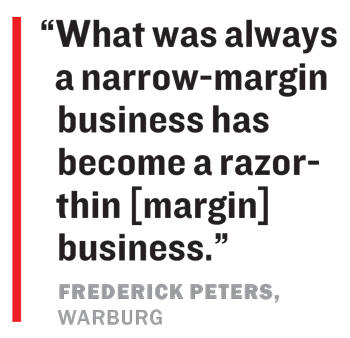Corcoran is consolidating. Compass is making lay offs. Residential firms are going lean.
Call it a sign of the times that these days brokerage executives show off their smarts by pulling out financial statements and reviewing expenses line by line.
“Everybody is doing that right now,” said Steve Murray, president of Real Trends, which analyzes brokerage valuations. The question is whether they’re making the right choices on where to save versus splurge.
Murray recalled one client, a firm that brings in $30 million in annual revenue, uncovering $400,000 in expenses it could effortlessly cut. For others — particularly in New York City, where one firm’s cut can quickly become another firm’s gain — it’s more complicated.
Rivalries have intensified over the past year, and a string of aggravating factors have combined to ratchet up the pressure on New York’s top residential firms.
Amid an already troubled luxury market, 2019 was also the first year that the federal tax overhaul’s cap on state and local tax deductions was truly felt, leading to a slow but steady exodus of high-net-worth buyers to lower-tax states like Florida.
Meanwhile, New York lawmakers are determined to impose new taxes on high-end home sales and limit the fees brokers can charge. Though the industry has rallied in response, whether the brokerage community can sustain a united front against challenges from City Hall and Albany remains an open question — particularly in light of the firms’ previous failure to come together to confront the city’s de facto consumer-facing multiple listings system, StreetEasy.
Though some midsized brokerages contend they may have suffered the most from the lack of any common ground in such a cutthroat market, the past year also dealt body blows to the three largest players.
Corcoran is now consolidating with Citi Habitats, the rental-focused brokerage it bought in 2004, in a move that will allow it to close some offices.
Meanwhile, at Douglas Elliman, net income for the brokerage tanked a stunning 81 percent in the third quarter of last year, leading Elliman’s parent, Vector Group, to announce that it would slash its dividend starting in 2020.
Compass, which has raised $1.5 billion over the past eight years, has also been feeling the heat following the implosion of WeWork, with whom the brokerage shares a major backer, SoftBank Group. The Japanese investment fund’s troubles with its infamous coworking unicorn has put Compass’ own path to profitability under a microscope, and the fast-growing, free-spending firm has started laying off workers.
The business of residential real estate in New York City has always been a dog-eat-dog world, but with the luxury market slumping, the dogs are hungrier than usual — and the fights increasingly fierce.
“It’s never been worse,” said Shaun Osher, the founder of boutique brokerage, CORE Real Estate. “You’ve got the large firms suing each other, out to get each other, acting immorally, unethically. It seems as if all goodwill has been thrown out.”
 Broken business?
Broken business?
The challenges facing the brokerage industry go beyond the troubles in New York. Big national firms like Elliman, Compass and Realogy are reacting to pressures being felt coast to coast.
“If nobody is making any money, then something has to change,” said Anthony Paolone, an analyst at JPMorgan Chase who covers Realogy. “The market has to find a place where it can function and operate.”
Realogy, the country’s largest brokerage conglomerate, has spent the past year closing offices and combining teams nationwide, as well as selling off businesses to cut cost and service $3.5 billion in debt as losses mount. The holding company’s third quarter 2019 earnings revealed it lost $69 million, compared with 2018’s net income of $104 million over the same period — a drop it attributed to the write-down in value of its NRT business, which includes Corcoran.
But Corcoran president and CEO Pamela Liebman said the consolidation with Citi Habitats is not a cost-cutting measure imposed by NRT.
“Gary [Malin, Citi Habitats president] and I orchestrated this — this is not Realogy,” she said. “We want to have a larger footprint, and this is part of our long-term growth strategy.”
Still, even as a bid to boost head count and market share — giving Corcoran a combined 2,420 agents responsible for $7 billion in annual sales and 22,000 rental transactions last year — the move shows the brokerage’s need to adapt to increasing pressures affecting its home market and its national parent.
Corcoran also suffered a data breach last fall that laid bare compensation figures that firms go to great lengths to keep under wraps — a disclosure that made the increasingly cutthroat competition for agents even more fraught, especially with notoriously aggressive recruiter Compass.
In a lawsuit filed last July, Realogy accused Compass of price-fixing, “predatory” agent poaching and other “illegal schemes to gain market share at all costs and to damage, or even eliminate, competition.”
But the venture-backed firm’s growth-at-all-cost business model that has caused such consternation might have hit a wall, as Compass recently announced it is laying off 40 employees nationwide across its IT, marketing and M&A teams.
The cuts punctuate the end of a period of massive growth for Compass, which in 2017 announced an ambitious plan to seize 20 percent market share in 20 major U.S. cities by 2020. But late last year, CEO Robert Reffkin conceded in a companywide letter that Compass had fallen well short of that target with market share closer to 10 percent in most of the cities it targeted.
At latest count, the company has 18,000 agents and staff across the U.S., but its mad dash for growth might be coming to an end.

“It’s going to be harder for Compass to continue at the pace they’ve been going,” Murray said. “Because the industry has now reacted.”
He pointed to rising commission splits as one example of firms reacting to Compass.
Murray said his firm, which has worked on acquisitions with Compass in the past, had expected the firm to buy more than 10 additional brokerages, but none of those transactions came to fruition.
“My guess is they are focused more on when and how are [they] going to get profitability,” Murray said.
In May, Elliman declared it would embark on cost-cutting similar to 2008 and 2009 in the face of ballooning losses in gross commission income in New York City — a situation made worse by new taxes imposed by Albany last summer. By the end of the year, Elliman’s publicly traded parent announced it would halve its quarterly dividend starting this year and eliminate its annual dividend altogether.
After years of relative stability, Vector’s stock plunged by more than half in the first half of 2019, and its third-quarter net income dropped my more than 80 percent.
On the November earnings call when Vector CEO Howard Lorber announced the dividend cuts, he was optimistic that Elliman’s business would turn around, provided there are no further legislative shocks.
“Look, I think we’ve somewhat survived,” he said, pointing to the cap of the SALT deduction in 2018 and the mansion and transfer tax hikes introduced by New York State last year. “And if nothing else happens, with some cost cutting and so forth, we’re going to be more profitable going forward.”
Abating taxes
The chance that “nothing else happens” in Albany or City Hall this year seems slim, however, if the real estate industry doesn’t find a way to come together to have a political impact.
Last year the industry was hit with multiple tax increases and state laws making condo conversions more difficult. And more tax hikes are on the table this year — including a pied-à-terre tax on nonprimary homes.
“I was personally caught off guard,” said Diane Ramirez, the chief executive at Halstead. “We’ve always counted on other people being our voice … but it’s at a point now where every one of us needs to be a voice and speak out about what’s good for this city.”
Ramirez, who also chairs the Real Estate Board of New York’s residential brokerage board of directors, said Halstead has established a task force to evaluate lobbying and organizing efforts on a case-by-case basis so the firm’s leadership and agents aren’t caught unawares going forward.
REBNY has also been trying new ways to better organize and mobilize for residential brokerage interests.
Last June, just days after Albany passed the new rent laws, hundreds of agents showed up at City Hall to protest a bill that could curtail their commission on rental transactions where they represented an owner. REBNY had set up meetings and calls with lawmakers in the lead up to the public hearing. A few firms even closed their offices to encourage agents to turn up at City Hall, and even big-shot executives at the city’s largest firms came down from their Midtown eyries to join the fight.
 “I’m not a protester, but I certainly speak my mind when it’s called for,” said Steven James, Elliman’s New York President and CEO. He stood on City Hall’s steps all day and described the event’s “huge” turnout as proof of “just how strong this community can be, you know, when they’re riled up.”
“I’m not a protester, but I certainly speak my mind when it’s called for,” said Steven James, Elliman’s New York President and CEO. He stood on City Hall’s steps all day and described the event’s “huge” turnout as proof of “just how strong this community can be, you know, when they’re riled up.”
The bill at issue that day has languished in committee ever since, but to see similar success against other legislative threats, the brokerage community will have to do more than get “riled up” — it will have to get organized.
And time is running out. Progressive legislators in Albany have made it clear that the dreaded pied-à-terre tax is back on the agenda this year.
Other organizing efforts include the New York Residential Agent Continuum, founded by Compass and Sotheby’s agents in late 2018. That group has now hired its own lobbyist to advocate for residential agents.
Brokerages Brown Harris Stevens and Halstead are also working on an effort to organize and mobilize high-end homeowners. Liebman said Corcoran is also part of the initiative and that she has been making calls urging other firms to join the effort.
“Everybody sees the potential writing on the wall and wants to rely on each other to join forces in this political fight,” she said.
“No one person can do this alone,” Ramirez agreed. “REBNY can’t do it alone either.”
REBNY president Jim Whelan said the group is working “collaboratively” with these other groups and rejected any suggestion of a turf war. “People want to sort of portray this as a source of conflict, but it’s not,” he said. “What matters is the end goals that we’re all seeking to achieve.”
Road to StreetEasy
There’s no better symbol of the damage factionalism can do to the brokerage business as a whole than the sector’s failure to come together to confront New York’s de facto multiple listings service, StreetEasy.
The platform, owned by Zillow Group, took the industry by storm after the brokerages gave up on an effort to create their own centralized listings system. And since then, StreetEasy’s relentless expansion of its fee-based advertising has led many brokerages, especially midsized firms, to hope that a coordinated effort can be revived.
Warburg CEO Frederick Peters said the lesson from StreetEasy is that, despite a handful of firms holding a large number of listings, previously no one company ever had “so much market power that they could control the way information was handled without uniting with the rest of the community.”
But companies sitting on those other big piles of listings have been more reluctant than others to unite. “Certainly it’s taken a long while for several of the larger firms to really understand that,” Peters said.
Back at the turn of the century — long before StreetEasy — there was an effort to create a public-facing MLS through REBNY, but those plans were abandoned when the larger firms balked at sharing their listings, clearing the way for StreetEasy to fill the void and leading many firms to blame Elliman and Corcoran for scuttling the initiative — a charge both firms resist.
Liebman said that, after the first attempt in the early aughts, “it became such a battle with the small and the midsized firms fighting Corcoran and Elliman that we just said fine, forget it.”
She also said that calls for Corcoran to lead a charge against StreetEasy were unrealistic since such a concerted campaign would leave the firm open to antitrust charges.
“Going forward, I can only make a decision for my firm,” she said. “They probably want us to stand up and say Corcoran is leaving third party platforms and you should all follow. But that’s never going to happen. … I’m not going to jail.”
But even Compass — not known for fostering unity among brokerages — has called for greater cooperation on listings.
“I just find it to be frustrating and head-scratching,” said Rory Golod, who leads the brokerage’s New York region. “We can do just about anything possible … but we can’t provide our agents with timely data.”
Golod said Compass would financially support any initiative to create a unified MLS, saying it would be the best thing for consumers and agents.
“We have always been in favor of working together to create a better overall [industry], and I’m still willing to do that,” he said.
Others doubt the possibility of any real cooperation among brokerages.
“We’re trying to come together and take down StreetEasy. It’s not going to go anywhere,” said Eddie Shapiro of Nest Seekers International. Even when brokerage leaders sit down to talk about a problem they supposedly agree on, “the minute you walk out, everyone’s looking to stab each other in the back.”
Money talks
Brokerages may not be able to get together on much, but something they are all on the same page about in this high-pressure environment is cost-cutting.
Early last year, Realogy — the parent company of the Corcoran Group and Sotheby’s International Realty — announced it needed to trim $70 million from its 2019 expenses.
Sotheby’s CEO Philip White said that while most of those savings will be captured “behind the scenes” with major vendor contractors, his firm found some savings by collapsing the two management teams that used to run Sotheby’s franchise business and company-owned brokerage into one.
Liebman conceded that the Citi Habitats merger will realize some savings, notably from shuttering several Citi Habitats offices in Manhattan and Brooklyn, but she said that wasn’t a factor in the decision.
Warburg Realty shuttered one of its offices and acknowledged it was a response to pressures on profits.
“What was always a narrow-margin business has become a razor-thin [margin] business,” Peters said.
Bond New York also closed an office before announcing the acquisition of a 56-agent firm, Caliber. The latter said it wanted to reinforce itself due to “recent changes in the market.”
Similarly, boutique family firm Stribling & Associates was gobbled up by Compass last spring in what former president EA Stribling-Kivlan — now senior managing director of real estate at Compass — described as a situation where “the train was leaving the station.”
Meanwhile, BHS sent a handful of longtime executives packing in an internal shakeup to make room for the firm to invest more in marketing and technology. “We’re a business that likes to make a profit, to pay bills, etc.,” CEO Bess Freedman said.
Compass had long appeared to float above questions of profitability on its deep cushion of VC money. But last month’s round of layoffs seemed to bring the company back down to earth.
“Something changed in the ecosystem, and I think it’s the investor focus on profitability,” Realogy’s CEO Ryan Schneider said on a November earnings call.
Shapiro said all firms are feeling pressure to justify expenses.
“I think we’re coming to a new era where accountability is coming to the forefront,” he said, speaking generally and not particularly about Compass.
But Shapiro said that venture capitalists pouring money into brokerages like Compass and midsized Triplemint — which raised $17 million over the past several years — undermines the sector across the board.
“The industry has always been competitive, but there was almost an order to the madness,” Shapiro said. “But the past few years [external investors] created so much chaos, and it didn’t benefit anyone — it didn’t even benefit them.”
The influx of capital raised the cost of doing business for everyone and increased the need to show a profit, making consolidation and cost-cutting inevitable.
“Every 10 or 15 years there’s some consolidation,” he said. “It’s kind of a race to the bottom.”
Editor’s note: The story has been revised from the print version to more accurately describe EA Stribling-Kivlan’s role at Compass.
